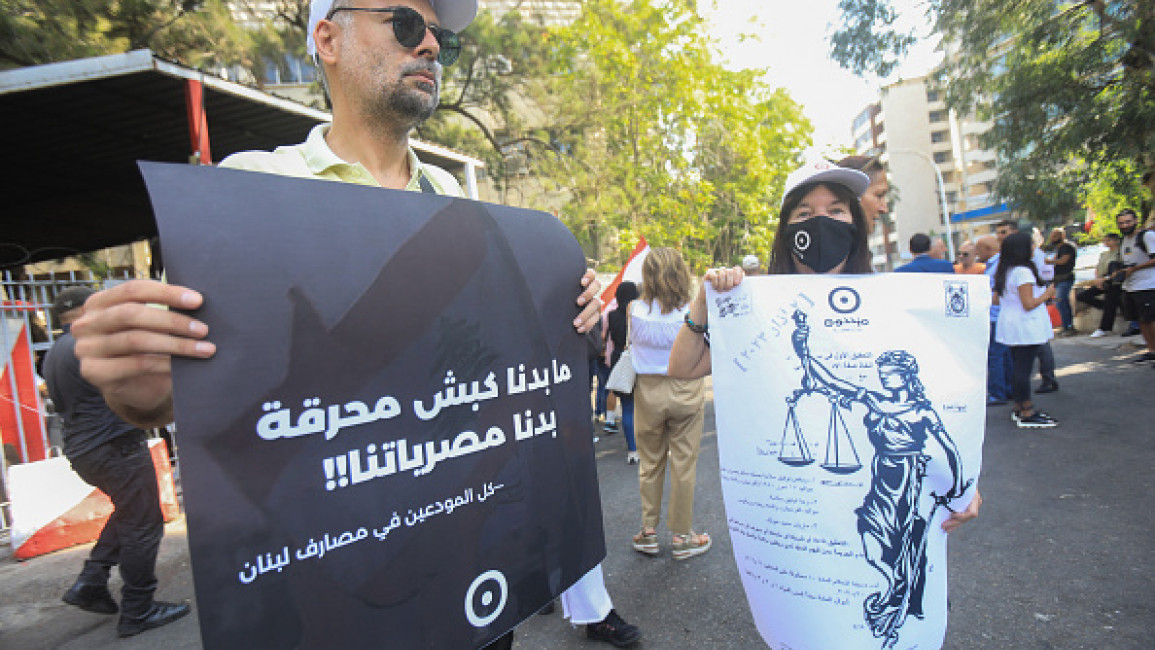Former Lebanon bank chief Riad Salameh's detention extended as judge issues new arrest warrant
A Lebanon judge on Monday extended the detention of the country’s disgraced former Central Bank governor Riad Salameh, after interrogating him in an embezzlement case.
Investigating Judge Bilal Halawi questioned Salameh on Monday for two and a half hours, resulting in another arrest warrant being issued against him and an additional hearing scheduled for Thursday where his detention could be extended further.
During Salameh's hearing, protesters and some lawmakers gathered outside the Justice Palace, calling on the judiciary to ensure Salameh was not freed on bail with some even pelting the police convoy as he arrived at the complex.
They also called on Salameh to expose those in the powerful ruling elite allegedly responsible for the billions lost during the ongoing economic crisis.
Once one of the region's most respected economists, Salameh is accused of amassing a huge fortune during his time as head of the central bank and now faces charges of embezzlement, money laundering, and tax evasion in separate probes in Lebanon and abroad. He has repeatedly denied any wrongdoing.
Salameh has been held in custody since last week after he attended a hearing at the Justice Palace in Beirut where acting Public Prosecutor Judge Jamal Hajjar ordered his arrest, allegedly to the shock and surprise of the banker.
The 3 September hearing focused on deals conducted between financial firm Optimum Invest, which was mentioned in a preliminary forensic audit carried out at the Central Bank of Lebanon (BDL) last year, and BDL over the purchase and sales of treasury bonds worth over $40 million.
That case is reportedly separate from others being investigated, where billions of dollars worth of transactions are being looked into.
The arrest of Salameh, who dodged search warrants for over a year but was banned from leaving Lebanon, has shaken a country where elites rarely face justice.
Since 2019, Lebanon has been mired in its worst-ever economic crisis, largely blamed on the former banking chief and the country's ruling elite.
Germany and France issued arrest warrants against Salameh in May 2023 in connection to alleged money laundering and fraud. German prosecutors later cancelled their warrant against Salameh but three months later, the US announced coordinated sanctions with Canada and UK against him.
Many in Lebanon are sceptical about true accountability for elites given the judiciary’s long history of ties with powerful politicians and former warlords, with big corruption cases often going unresolved.
Some argue that the country's sectarian leaders want to scapegoat Salameh, who they say is just one piece in the jigsaw of Lebanon's economic malaise.
When the financial meltdown began in late 2019, banks locked Lebanese out of their bank savings. The Lebanese lira has lost over 90 percent of its value, purchasing power has dropped, while inflation has skyrocketed. Lebanon's institutions, namely the electricity sector, have come close to total collapse.
Corruption, the squandering of public funds, mismanagement in the public sector and clientelism are blamed for the country’s economic woes.
(The New Arab, Agencies)







